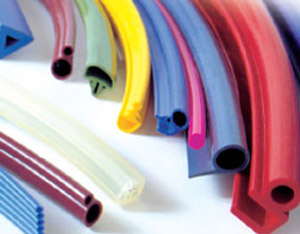EPDM Rubber Tubing at Vanguard Products
At Vanguard Products, we engineer and manufacture EPDM tubing as part of our expansive portfolio of natural and synthetic rubber products. EPDM rubber tubing offers many unique properties that make it optimal for use in a variety of industries and applications. With over 50 years of experience, we have developed the expertise necessary to consistently deliver the best products for your needs.
If you would like to learn more about Vanguard Products, please contact us today.
Capabilities and Ranges for EPDM Elastomers / Profiles / Tubing
- Single, Coextrusion, and Tri-Extrusion capability
- Multi-Lumen Extrusion
- Multiple Durometer/Hardness
- Multiple Material/Color Extrusion
- Insert Extrusion
- 0.040″ to 3″ Plus
- Custom Formulation for Mechanical Properties, Chemical Resistance, and Temperature Resistance; and Color Matching
- Die Cutting
- Adhesive Application
- Cutting
- Bonding
- Frame & O-Ring Fabrication
- Special Put-Ups
- Special Packaging
- PSA Application

Industries Served
EPDM’s applications vary across many industries, but here are some examples of common use cases:
- HVAC. HVAC systems rely on EPDM tubing for pressure switch tubing and drain tubes, among others.
- Automotive. EPDM tubing is often used in vehicles as heating and cooling hoses, washer fluid tubing, within emissions systems, and in hydraulic systems.
- Industrial. Industrial facilities commonly use EPDM rubber tubing as radiator and hydraulic hoses on machinery and equipment. Chemical manufacturers, in particular, benefit from EPDM tubing for its innate resistance to many chemistries.
- Nuclear/Biological/Chemical Warfare (NBC). The military has increasingly turned to EPDM rubber for use in various NBC protective and decontamination equipment thanks to its ability to resist harsh cleaning agents after use.
- High Precision Cost Efficient Production in ISO 9001:2015 Certified Facility
- Custom Compound Formulation for Precise Engineered Performance and Optimized Cost
- In-House Economical Secondary Operations such as Cutting, Bonding, and O-Ring Fabrication
- Multi-Lumen and Tight Tolerance Production for Optimal Cost
- Manufacturer and Complete One Stop Shop for Extrusions in Engineering Elastomers with Extensive Application Engineering Support

Typical Applications for EPDM Elastomers / Profiles / Tubing
Vanguard’s custom EPDM Elastomers / profiles are used in many applications and industries throughout the world. Vanguard has vast experience in designing and manufacturing for virtually any requirement including:
- Tubing
- Military NBC Seals, Gaskets And Tubing
- Washers And Seals For Electronics And Electrical Equipment
- Architectural And Window Seals
- Electrical Connector Seals
- Condensate Tubing For HVAC Equipment
- Outdoor Electrical Enclosures Seal
- Dry Cleaning Equipment Tubing
- Silos And Storage Tank Seals And Tubing
- Medical Equipment Seals And Tubing
- Bumpers
- Plastic Case Seals

Part Number Cross Reference For EPDM Tubing
Vanguard EPDM Tubing Also Available At:












